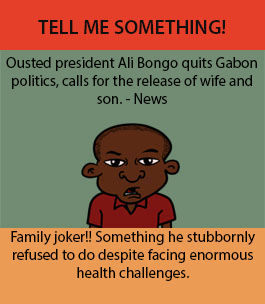Ousted President Ali Bongo quits Gabon politics: The Power of Reverence and Relevance.
Hardly is any
condition permanent. What makes a god (look) so powerful and invincible is the
degree of reverence it enjoys from its subjects or worshippers; once the
subjects withdraw their reverence, the god becomes irrelevant and obsolete. Does
this analogy sound familiar to the African political domain and the leaders?
The news that
Gabon's deposed President Ali Bongo announced he would quit politics and begged
the government to release his detained wife and son, a year after he was
toppled from power by a military coup, might sound strange to many who are
familiar with the African political arena. However, to those who understand
power and human psychology, it is a reminiscence of human powerlessness when
cornered or faced with irreversible choices. Ali Bongo Ondimba, the 65-year-old
deposed President of oil-rich Gabon, whose family had been in power for 55
years, is not an exception to this ugly reality.
"I wish to
reaffirm my withdrawal from political life and the definitive renunciation of
any national ambition," Mr Bongo said in a letter addressed to the
Gabonese people and called for the release of his wife and son, who are in
detention awaiting trial on corruption allegations, following the 2023 coup,
led by Gen Brice Oligui Ngeuma, which ended his Bongo's 14-year rule.
Really? Could this
conciliatory and apologetic message be coming from Ali Bongo, who refused to
give up power despite facing severe health challenges? Interestingly, Mr Bongo
suffered a stroke in 2018, which left him visibly paralysed, a pitiful condition
that had prompted many to call on him to step down as President to focus on his
fragile health. He bluntly refused to listen to the honest appeals nor his
visibly declining health condition; instead, he hung on to power despite
spending most of his presidency in the hospital abroad, leaving the affairs of
his country, Gabon, in a vulnerable state – the same country he took an oath as
President to defend. Bongo's ambition and greed come before Gabon's wellbeing.
What a tragedy.
While retaliating
his decision to quit politics, Mr Bongo added that his decision also applied to
his wife and children. This is a very interesting shift and development.
One might ask whether Mr Bongo would have been singing the tone of reconciliation if the army had not seized power last August after Mr Bongo was declared the winner of the election, which was disputed by the opposition. Would Bongo have decided to leave the political arena if the military junta did not crip his political wings? The military junta, led by Gen Brice Oligui Ngeuma, played a significant role in this power shift. Deposed and placed under house arrest in the capital, Libreville, a week after the military takeover, with his movements remaining restricted and subject to daily surveillance, suddenly, the once most powerful god in Gabon has become irrelevant because the subjects have withdrawn their support.
But that
withdrawal of support for Bongo was not necessarily the joker that brought him
to his knees and made him withdraw from politics. The detention and persecution
of his family were the winning jokers.
Mr Bongo's call
for the release of his family is not just a political move, but a deeply
personal plea. He urged the military government to end what he described as
"violence and torture" committed against them. Mrs Bongo faces money
laundering, forgery, and falsification of documents; she has not publicly
commented upon or denied those severe allegations. This call for his family's
release is a clear indication of the personal toll the political situation has
taken on Ali Bongo.
It is not the
intention of the writer to support the non-democratic transfer of power
anywhere; far from that. The power must rest in the hands of the citizens, the
electorate, not the military. Unfortunately, the masses have yet to appreciate
how much power they have and the control they can exercise over their leaders.
Politics is a game where all players must watch every player's move and action
to avoid being defeated and rendered irrelevant. To win, one must study and
master the opponent's weaknesses and vulnerabilities. That is the exact game
the military junta in Gabon, led by Gen Brice Oligui Ngeuma, is playing, and
the result is obvious. Ali Bongo Ondimba, who had once ignored his fragile
health, the will of his people, and the declining economic, political and
social situation of Gabon to stubbornly remain in power, has suddenly become
the lonely voice in the wilderness, begging to go into political oblivion and
exile. This shift in power dynamics underscores the influence the masses can
have in political affairs.
Unless the masses
understand and appreciate their power, their perceived powerful gods will
continue to torment the subjects, instigating fears and an imaginary state of
invincibility in their minds. Take a firm stand, put the winning joker, the
game changer, on the table, and you will see how fragile, fearful and weak that
once feared god has become. Yes, the degree of power and control a god has over
his subject depends on the degree of reverence it gets from the subjects or
worshipers; once the subjects withdraw their reverence, the god becomes
irrelevant. I wish the African masses knew they had the last joker to their
destiny. Understanding one's power is the key to enlightenment in the game of
politics.

